新概念英语第一册87课
- 格式:ppt
- 大小:1.71 MB
- 文档页数:33
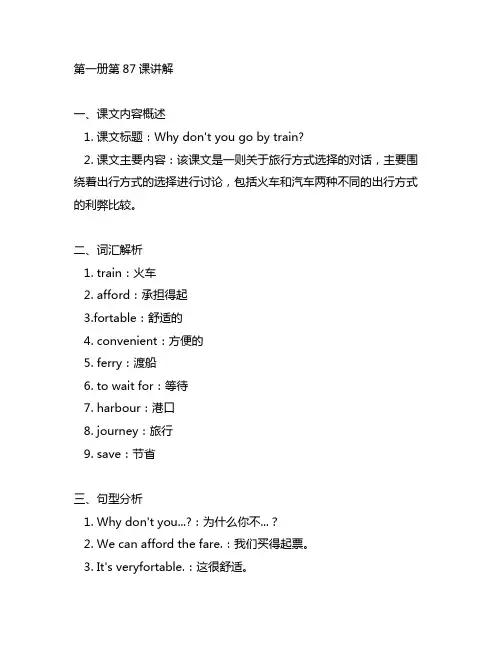
第一册第87课讲解一、课文内容概述1. 课文标题:Why don't you go by train?2. 课文主要内容:该课文是一则关于旅行方式选择的对话,主要围绕着出行方式的选择进行讨论,包括火车和汽车两种不同的出行方式的利弊比较。
二、词汇解析1. train:火车2. afford:承担得起3.fortable:舒适的4. convenient:方便的5. ferry:渡船6. to wait for:等待7. harbour:港口8. journey:旅行9. save:节省三、句型分析1. Why don't you...?:为什么你不...?2. We can afford the fare.:我们买得起票。
3. It's veryfortable.:这很舒适。
4. It's very convenient.:这很方便。
5. You have to wait for hours.:你得等上好几个小时。
四、重点句子写作1. Why don't you go by train? It's very convenient.2. We can afford the fare, and it's veryfortable.3. You have to wait for hours for the ferry, and the harbour isa long way from here.4. We can save a lot of time if we go by train.五、语法分析1. This is the first time...:这是第一次...2. 本课文中涉及了现在完成时和一般现在时的运用,例如:We can afford the fare;这是现在时的肯定句。
It's veryfortable;这是现在时的描述句。
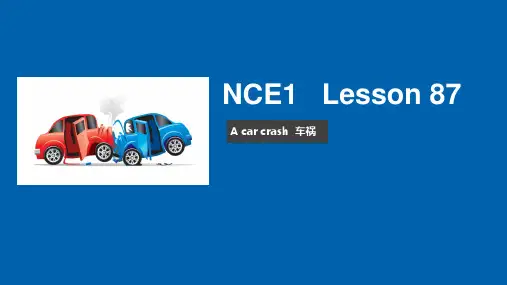
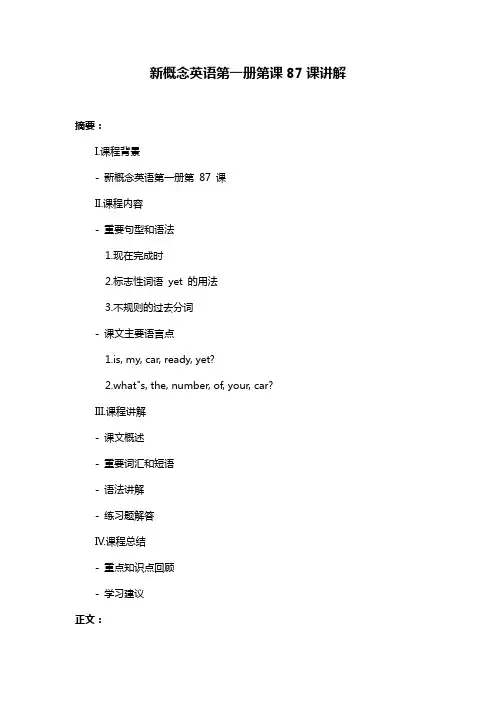
新概念英语第一册第课87课讲解摘要:I.课程背景- 新概念英语第一册第87 课II.课程内容- 重要句型和语法1.现在完成时2.标志性词语yet 的用法3.不规则的过去分词- 课文主要语言点1.is, my, car, ready, yet?2.what"s, the, number, of, your, car?III.课程讲解- 课文概述- 重要词汇和短语- 语法讲解- 练习题解答IV.课程总结- 重点知识点回顾- 学习建议正文:新概念英语第一册第87 课主要讲解了现在完成时、标志性词语yet 的用法以及不规则的过去分词等语法内容。
通过课文的学习,我们可以更好地理解和掌握这些语法知识,并将它们应用到实际交流中。
在课文中,我们学习了一些重要的句型和语法,如现在完成时、标志性词语yet 的用法以及不规则的过去分词。
这些语法内容是英语学习中的基础,对于初学者来说非常重要。
通过学习这些内容,我们可以更加准确地表达自己的观点和想法,同时也能更好地理解他人的表达。
除了语法内容外,课文还包含了一些重要的语言点,如is, my, car, ready, yet?和what"s, the, number, of, your, car?等。
这些语言点可以帮助我们更好地掌握英语的基本句型和表达方式,从而提高我们的英语水平。
在课程讲解部分,我们详细介绍了课文的概述、重要词汇和短语、语法讲解以及练习题解答。
通过这部分的学习,我们可以更加深入地理解课文内容,掌握语法知识,并提高自己的英语能力。
在课程总结部分,我们回顾了本课的重点知识点,并给出了学习建议。
这些建议可以帮助我们更好地巩固所学内容,提高英语水平。
总之,新概念英语第一册第87 课为我们提供了一个很好的学习机会,让我们能够更好地掌握英语语法知识,提高英语能力。
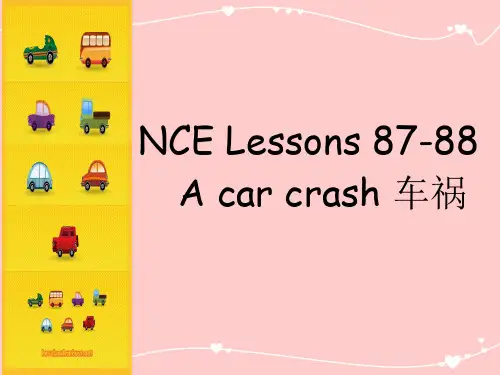
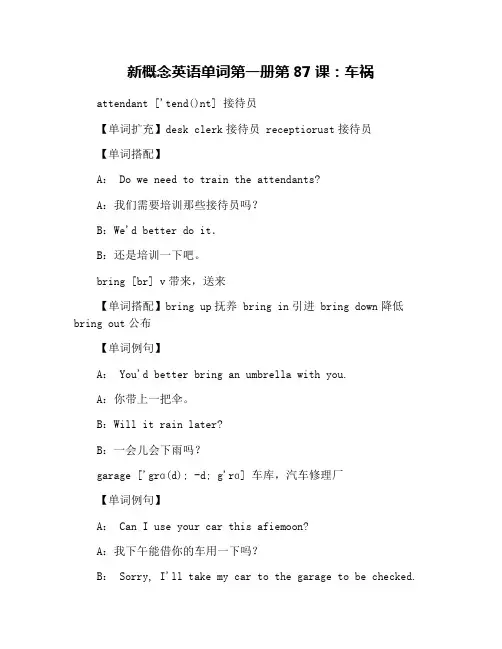
新概念英语单词第一册第87课:车祸attendant ['tend()nt] 接待员【单词扩充】desk clerk接待员 receptiorust接待员【单词搭配】A: Do we need to train the attendants?A:我们需要培训那些接待员吗?B:We'd better do it.B:还是培训一下吧。
bring [br] v带来,送来【单词搭配】bring up抚养 bring in引进 bring down降低bring out公布【单词例句】A: You'd better bring an umbrella with you.A:你带上一把伞。
B:Will it rain later?B:一会儿会下雨吗?garage ['grɑ(d); -d; g'rɑ] 车库,汽车修理厂【单词例句】A: Can I use your car this afiemoon?A:我下午能借你的车用一下吗?B: Sorry, I'll take my car to the garage to be checked.B:对不起,我得把车拿到修理厂去检查。
crash [kr] 碰撞【单词扩充】collide碰撞 bump碰撞【单词搭配】crash into闻入,撞上【单词例句】A: His son was killed in an automobile crash a few days before.A:他的儿子几天前因车祸死了。
B:He must be very sad.B:他肯定很难过。
lamppost[lmppst] 灯杆路灯柱repair [r'pe] v修理【派生词】repairman修理工【单词扩充】mend修理 fix修理【单词例句】A:Oh,my bike is broken.A:哦,我的自行车坏了。
B:Let me see.MaybeI can repair it for youB:我看看,没准我能帮你修修。
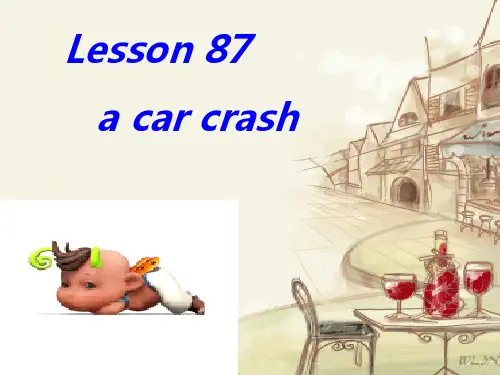
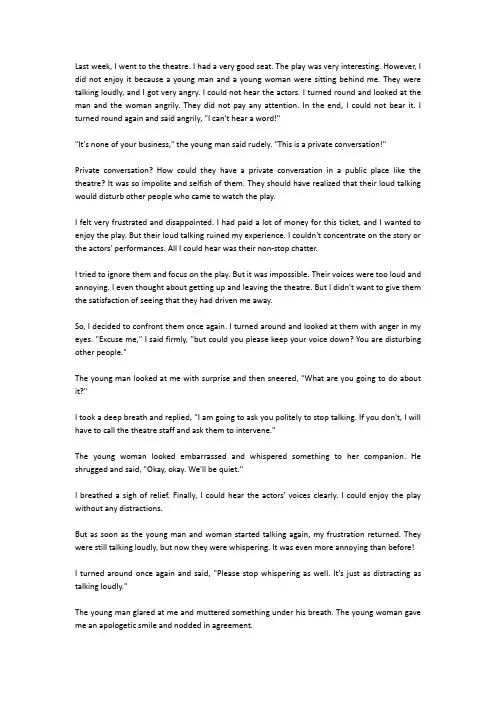
Last week, I went to the theatre. I had a very good seat. The play was very interesting. However, I did not enjoy it because a young man and a young woman were sitting behind me. They were talking loudly, and I got very angry. I could not hear the actors. I turned round and looked at the man and the woman angrily. They did not pay any attention. In the end, I could not bear it. I turned round again and said angrily, "I can't hear a word!""It's none of your business," the young man said rudely. "This is a private conversation!"Private conversation? How could they have a private conversation in a public place like the theatre? It was so impolite and selfish of them. They should have realized that their loud talking would disturb other people who came to watch the play.I felt very frustrated and disappointed. I had paid a lot of money for this ticket, and I wanted to enjoy the play. But their loud talking ruined my experience. I couldn't concentrate on the story or the actors' performances. All I could hear was their non-stop chatter.I tried to ignore them and focus on the play. But it was impossible. Their voices were too loud and annoying. I even thought about getting up and leaving the theatre. But I didn't want to give them the satisfaction of seeing that they had driven me away.So, I decided to confront them once again. I turned around and looked at them with anger in my eyes. "Excuse me," I said firmly, "but could you please keep your voice down? You are disturbing other people."The young man looked at me with surprise and then sneered, "What are you going to do about it?"I took a deep breath and replied, "I am going to ask you politely to stop talking. If you don't, I will have to call the theatre staff and ask them to intervene."The young woman looked embarrassed and whispered something to her companion. He shrugged and said, "Okay, okay. We'll be quiet."I breathed a sigh of relief. Finally, I could hear the actors' voices clearly. I could enjoy the play without any distractions.But as soon as the young man and woman started talking again, my frustration returned. They were still talking loudly, but now they were whispering. It was even more annoying than before!I turned around once again and said, "Please stop whispering as well. It's just as distracting as talking loudly."The young man glared at me and muttered something under his breath. The young woman gave me an apologetic smile and nodded in agreement.Finally, they stopped talking altogether. I could hear the play clearly and enjoy it without any disturbances. When the play ended, I left the theatre feeling relieved and satisfied that I had stood up for myself and asked them to be considerate of others.In conclusion, it is important to be aware of our surroundings and respect other people's right to enjoy public spaces peacefully. Loud talking or whispering in a theatre or any other public place is impolite and selfish. We should always try to be considerate of others and avoid causing any unnecessary disturbances.。
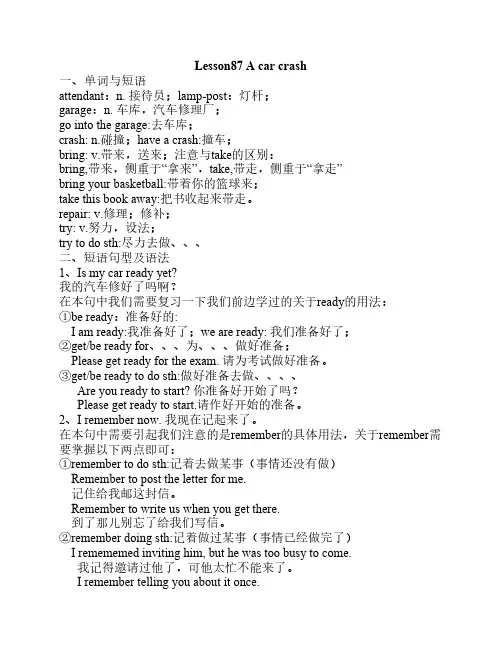
Lesson87 A car crash一、单词与短语attendant:n. 接待员;lamp-post:灯杆;garage:n. 车库,汽车修理厂;go into the garage:去车库;crash: n.碰撞;have a crash:撞车;bring: v.带来,送来;注意与take的区别:bring,带来,侧重于“拿来”,take,带走,侧重于“拿走”bring your basketball:带着你的篮球来;take this book away:把书收起来带走。
repair: v.修理;修补;try: v.努力,设法;try to do sth:尽力去做、、、二、短语句型及语法1、Is my car ready yet?我的汽车修好了吗啊?在本句中我们需要复习一下我们前边学过的关于ready的用法:①be ready:准备好的:I am ready:我准备好了;we are ready: 我们准备好了;②get/be ready for、、、为、、、做好准备;Please get ready for the exam. 请为考试做好准备。
③get/be ready to do sth:做好准备去做、、、、Are you ready to start? 你准备好开始了吗?Please get ready to start.请作好开始的准备。
2、I remember now. 我现在记起来了。
在本句中需要引起我们注意的是remember的具体用法,关于remember需要掌握以下两点即可:①remember to do sth:记着去做某事(事情还没有做)Remember to post the letter for me.记住给我邮这封信。
Remember to write us when you get there.到了那儿别忘了给我们写信。
②remember doing sth:记着做过某事(事情已经做完了)I remememed inviting him, but he was too busy to come.我记得邀请过他了,可他太忙不能来了。
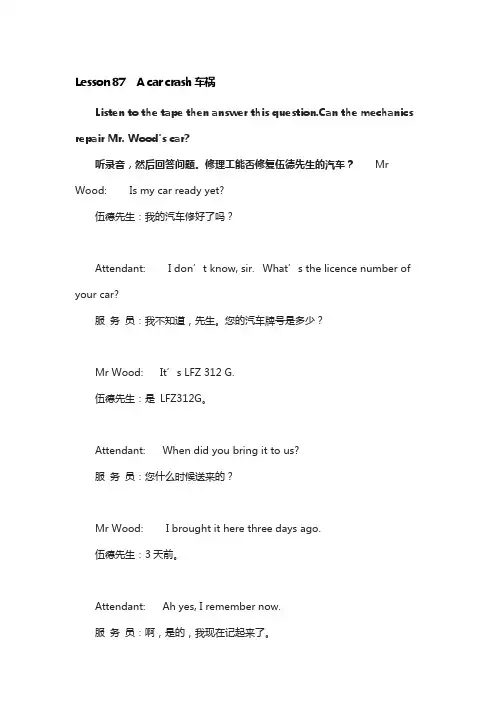
Lesson 87 A car crash车祸Listen to the tape then answer this question.Can the mechanics repair Mr. Wood's car?听录音,然后回答问题。
修理工能否修复伍德先生的汽车?Mr Wood: Is my car ready yet?伍德先生:我的汽车修好了吗?Attendant: I don’t know, sir. What’s the licence number of your car?服务员:我不知道,先生。
您的汽车牌号是多少?Mr Wood: It’s LFZ 312 G.伍德先生:是LFZ312G。
Attendant: When did you bring it to us?服务员:您什么时候送来的?Mr Wood: I brought it here three days ago.伍德先生:3天前。
Attendant: Ah yes, I remember now.服务员:啊,是的,我现在记起来了。
Mr Wood: Have your mechanics finished yet?伍德先生:你们的机械师修好了吗?Attendant: No, they’re still working on it. Let’s go into the garage and have a look at it.服务员:没有,他们还在修呢。
我们到车库去看一下吧。
Attendant: Isn’t that your car?服务员:这难道不是您的车吗?Mr Wood: Well, it was my car.伍德先生:唔,这曾是我的车。
Attendant: Didn’t you have a crash?服务员:难说您没有出车祸吗?Mr Wood: That’s right. I drove it into a lamp post. Can your mechanics repair it?伍德先生:是啊。
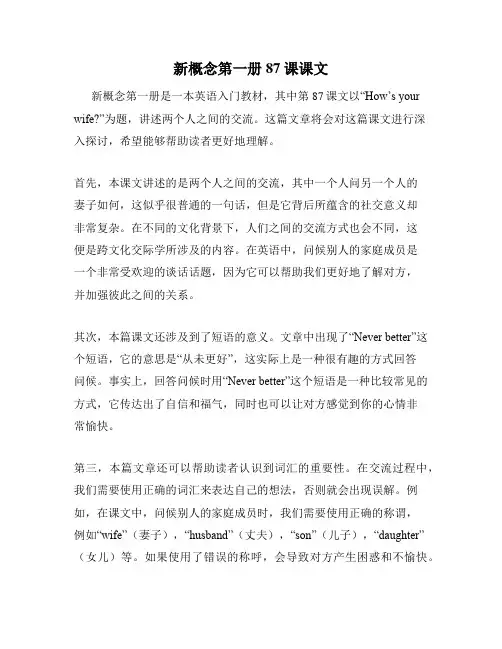
新概念第一册87课课文新概念第一册是一本英语入门教材,其中第87课文以“How’s your wife?”为题,讲述两个人之间的交流。
这篇文章将会对这篇课文进行深入探讨,希望能够帮助读者更好地理解。
首先,本课文讲述的是两个人之间的交流,其中一个人问另一个人的妻子如何,这似乎很普通的一句话,但是它背后所蕴含的社交意义却非常复杂。
在不同的文化背景下,人们之间的交流方式也会不同,这便是跨文化交际学所涉及的内容。
在英语中,问候别人的家庭成员是一个非常受欢迎的谈话话题,因为它可以帮助我们更好地了解对方,并加强彼此之间的关系。
其次,本篇课文还涉及到了短语的意义。
文章中出现了“Never better”这个短语,它的意思是“从未更好”,这实际上是一种很有趣的方式回答问候。
事实上,回答问候时用“Never better”这个短语是一种比较常见的方式,它传达出了自信和福气,同时也可以让对方感觉到你的心情非常愉快。
第三,本篇文章还可以帮助读者认识到词汇的重要性。
在交流过程中,我们需要使用正确的词汇来表达自己的想法,否则就会出现误解。
例如,在课文中,问候别人的家庭成员时,我们需要使用正确的称谓,例如“wife”(妻子),“husband”(丈夫),“son”(儿子),“daughter”(女儿)等。
如果使用了错误的称呼,会导致对方产生困惑和不愉快。
最后,本篇课文还可以提醒读者注意语音和语调的重要性。
我们不仅需要使用正确的词汇,还需要注意自己的语音和语调。
因为语音和语调可以传递出我们的情感和态度。
例如,在本篇课文中,当问候别人的家庭成员时,我们需要使用温暖友好的语音和语调,以表达亲密和关爱之情。
总之,本篇文章探讨了新概念第一册87课课文中涉及到的一些要点。
我们需要认识到跨文化交际学的重要性,了解短语的使用和词汇的正确性。
同时,我们需要注意语音、语调的重要性,以便更好地传达自己的情感和态度。
这些细节看似微不足道,但它们却很重要,它们可以帮助我们更好地融入英语世界,建立更好的人际关系。
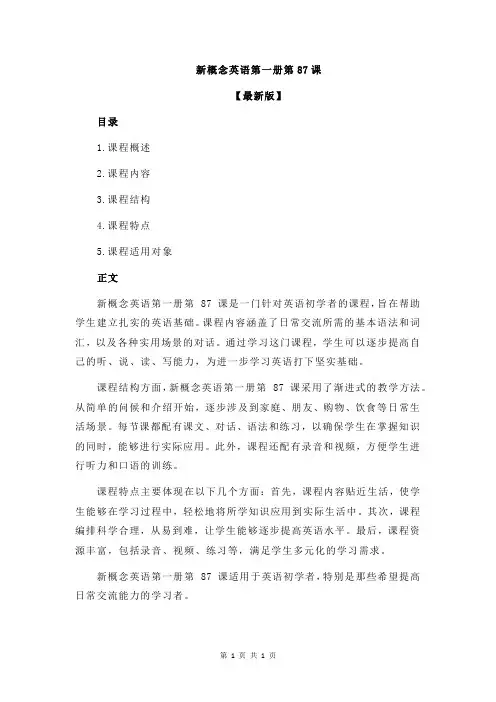
新概念英语第一册第87课
【最新版】
目录
1.课程概述
2.课程内容
3.课程结构
4.课程特点
5.课程适用对象
正文
新概念英语第一册第 87 课是一门针对英语初学者的课程,旨在帮助学生建立扎实的英语基础。
课程内容涵盖了日常交流所需的基本语法和词汇,以及各种实用场景的对话。
通过学习这门课程,学生可以逐步提高自己的听、说、读、写能力,为进一步学习英语打下坚实基础。
课程结构方面,新概念英语第一册第 87 课采用了渐进式的教学方法。
从简单的问候和介绍开始,逐步涉及到家庭、朋友、购物、饮食等日常生活场景。
每节课都配有课文、对话、语法和练习,以确保学生在掌握知识
的同时,能够进行实际应用。
此外,课程还配有录音和视频,方便学生进
行听力和口语的训练。
课程特点主要体现在以下几个方面:首先,课程内容贴近生活,使学生能够在学习过程中,轻松地将所学知识应用到实际生活中。
其次,课程编排科学合理,从易到难,让学生能够逐步提高英语水平。
最后,课程资
源丰富,包括录音、视频、练习等,满足学生多元化的学习需求。
新概念英语第一册第 87 课适用于英语初学者,特别是那些希望提高日常交流能力的学习者。
第1页共1页。
Lesson 87 单词讲解1.attendant n. 接待员2.bring (brought, brought) v. 带来,送来bring me a bookbrought bought /bɔ:t/bring buy3.garage n. 车库,汽车修理厂/ʹgæra:ʒ/ (英) /gəʹraʒ/ (美)4.crash n. 碰撞have a crashHe had a crash on the way home.mp-post n. 灯杆,路灯柱lamp 灯post 邮政,柱,杆6.repair v. 修理7.try v. 努力,设法Lesson 87 课文讲解Are you ready? Is my suit ready? Is dinner ready?Is my car ready?Is my dish ready?Is everything ready?yet 已经还Has he arrived yet? Have you read this book yet? He hasn’t arrived yet. I haven’t read this book yet.already 已经I have already finished my work.Have you already finished your work?惊讶,怀疑Have you finished your work already?Has he arrived already? Have you read this book already? licence plate numberbring us a bookbring a book to us bring it to usstill 依然,依旧情、be、助后,实词前I can still remember you.She is still young.I still live here.Can he speak English? Can’t he speak English?Do you like ice cream? Don’t you like ice cream? Are they Tom’s students? Aren’t they Tom’s students?Lesson 87 语法讲解现在完成时主语have / has 动词过去分词其它成份说话人主观上强调过去的动作或状态的延续性,且延续到现在。
新概念英语第一册第课87课讲解《新概念英语》第一册第87课是关于动词的时态的讲解。
本课主要介绍了三种基本的时态:一般现在时、一般过去时和一般将来时。
同时,本课还强调了动词形式的变化,并提供了一些例句进行说明。
以下是本课的讲解内容:1. 一般现在时:表示经常性的、习惯性的或普遍真理的动作或状态。
动词一般保持不变。
- The sun rises in the east.(太阳从东方升起。
)- I live in New York.(我住在纽约。
)2. 一般过去时:表示过去某个时间发生的动作或状态。
动词在第三人称单数后加-s,否定形式在助动词“do”后加“not”。
- He lived in London for many years.(他在伦敦生活了很多年。
)- They didn't go to the party last night.(他们昨晚没有去参加派对。
)3. 一般将来时:表示将来某个时间将要发生的动作或状态。
情态动词“will”用于肯定句中,否定句在“will”后加“not”。
- We will go shopping tomorrow.(我们明天将去购物。
)- She won't come to the meeting.(她不会来开会。
)此外,本课还介绍了其他时态的特殊形式,如现在进行时(be + 动词-ing)、过去进行时(was/were + 动词-ing)和将来进行时(will be + 动词-ing)等。
本课通过一些简单的例句,对动词时态进行了初步的讲解。
学习者需要通过大量的实践来熟练掌握不同时态的用法和动词形式的变化。
新概念英语第一册第课87课讲解一、课文概述新概念英语第一册第87课的主题是“购物”,通过讲述一位男士在商店里购买东西的经历,引导我们学习日常购物场景中的英语表达。
在这一课中,我们将学习到实用的购物词汇、口语表达以及简单的语法结构。
二、重点词汇和语法解析1.购物相关词汇:商店(shop)、购物(shopping)、顾客(customer)、售货员(sales assistant)、商品(goods)、价格(price)等。
2.口语表达:- How much is it?:这个物品多少钱?- Can I have a look please?:我能看一下吗?- Yes, you can.:可以,你可以看。
- I"ll take it.:我要买它。
- How much change will I get?:我能得到多少钱的找零?3.语法结构:一般现在时、一般疑问句、祈使句等。
三、实用口语表达在日常购物场景中,以下口语表达可以帮助我们更好地与售货员沟通:1.询问价格:Excuse me, how much is this item?2.请求试穿:Could I try this on, please?3.询问库存:Do you have this in stock?4.表达满意度:I like this.Can I have it?5.询问优惠活动:Do you have any promotions today?四、练习与提高建议1.跟读录音:多次跟读课文录音,模仿发音和语调,提高口语表达能力。
2.角色扮演:与朋友或家人一起进行角色扮演,模拟购物场景,巩固所学知识。
3.制作单词卡片:将本课所学词汇制成卡片,随时翻阅,加强记忆。
4.写作练习:以购物为主题,用所学词汇和语法结构进行写作练习,提高写作能力。
通过以上学习,相信大家能够在日常生活中更好地运用英语进行购物沟通。
不断练习和积累,英语水平一定会得到提高。